Abstract
John Locke'dan bahsedildiğinde, onun tabula rasa (boş tahta) ifadesinde
anlamını bulan deneysel (duyusal ve tecrübi) epistemoloji akla gelmektedir.
Ancak onun en az bu epistemolojik yönü kadar önemli ve etkili olan bir diğer
yönü de siyaset felsefesidir. Bu siyaset felsefesinde onun ele aldığı en önemli
problem toplumsal sözleşme ve mülkiyet üzerinden temellendirdiği, özgürlük
fikridir. Fakat Locke bu özgürlük fikrini insanlığın yaşadığı tarihi süreçler
üzerinden değil de daha çok doğa yasası ya da akıl üzerinden
temellendirilmiştir. Hâlbuki bir duyumcu olarak onun insanlık tarihinde tecrübe
edilen tarihsel gerçeklik üzerinden bir temellendirme yapması beklenirdi. İşte
bu makalede, tarihin değişim sürecinde ortaya çıkan yaşam tarzı farklılıklarını
dikkate alarak onun politik felsefesini anlaşılabilir hale getirmeye
çalışacağız. Bu bağlamda, siyaset felsefesinde birbiriyle yakından ilgili olan
aşağıdaki kavramlar yeniden ele alınacaktır: tabiat durumu, doğa yasası,
mülkiyet özgürlüğü, devlet, yasa, kuvvetler ayrımı, ticaret ve para. Tarihsel süreçteki
gelişmeler ışığında bu kavramlar göz önüne alınıp değerlendirildiğinde, onun
özgürlük fikri daha anlaşılır olarak ortaya konacaktır. Bu sayede hem mevcut
devlet, hukuk, özgürlük, demokrasi ve siyasette meşruiyet gibi kavramların
temelleri gösterilmiş olacak, hem de mevcut demokrasi deneyimimizin ne kadar
sıkı bir bütünlük arz ettiği hatırlatılmış olacaktır.
References
- 1. Akarsu, Bedia, “John Locke’un Devlet Felsefesi”, Felsefe Arkivi, 12. Sayı, 1961, (72-85).2. Bakırcı, Fahri, Locke ’ta Mülkiyet Anlayışı, Babil Yayınları, Ankara, 2004.3. Cevizci, Ahmet, Felsefe Sözlüğü, 6. basım, Paradigma Yayınları, İstanbul, 2005.4. Cevizci, Ahmet, Felsefe Tarihi, 3. basım, Say Yayınları, İstanbul, 2011.5. Çelebi, Emin, John Locke’un İdeler Teorisi Eleştirel Bir İnceleme, Gece Yayınları, Ankara, 2017.6. Değirmencioğlu Yıldız, Burcu, “John Locke’ta Doğa Durumu ve Direnme Hakkı”, Gazi Üniversitesi Hu-kuk Fakültesi Dergisi, C.XX, Sayı 3, 2016, (375-410).7. Locke, John, Hükümet Üzerinde İkinci İnceleme, (çev. Fahri Bakırcı), Ebabil Yayıncılık, Ankara, 2004.8. Magee, Bryan, Felsefenin Öyküsü, çev. Bahadır Sina Şener, Alfa Yayınları, İstanbul, 2017.9. Özcan, Mehmet Tevfik, “John Locke’un Birey Anlayışının Felsefi Temeli”, İstanbul Hukuk Fakültesi Mecmuası, Cilt LII, 52/1-4, Temmuz 2011, (559-586).10. Şeriati, Ali, Medeniyet Tarihi I, (çev.. Ejder Okumuş), Fecr Yayınları, 2. Basım, Ankara, 2013.11. Topdemir, Hüseyin Gazi ve Yavuz Unat, Bilim Tarihi, Pegem Akademi, 2. basım, Ankara, 2009.12. Usta, Sadık, Dünyayı Değiştiren Düşünürler III, Kafka, İstanbul, 2018.13. Çal, Canan, “Ibn Khaldûn And John Locke: A Polıtıcal Interpretatıon Of Socıety – A Road To Prıvate Property”, Yüksek Lisans Tezi, ODTÜ Sosyal Bilimler Enstitüsü, Felsefe Bölümü, Şubat, 2014.14. Yer, Sadi, “Gazali ve İbn Haldun’da Din-Devlet İlişkisi”, Yüksek Lisans Tezi, İstanbul Üniversitesi, Sosyal Bilimler Enstitüsü Felsefe ve Din Bilimleri ABD, İstanbul, 2004.15. Rousseau, Jean Jacques, Toplum Sözleşmesi, çev. Vedat Günyol, Türkiye İş Bankası Kültür Yayınları, İstanbul, 2013.16. Aydın, Ayhan, Felsefe Düşünce Tarihi, Pegem Akademi, 6. basım, Ankara, 2011.
Abstract
Whenever we mention about John Locke, we
think of his empiricist (sensory and experiential) epistemology given with tabula rasa (empty board) analogy.
However, it is political philosophy, which is at least as important and
effective as this epistemological aspect. The most important problem he dealt
with in this political philosophy is the idea of freedom
based on social contract and property. But Locke's idea of freedom is based not
on historical processes of mankind, but rather on natural law or reason.
However, he was expected to build a basis on the historical reality experienced
in the history of mankind. In this article, we will try to make his political
philosophy understandable by taking into account the lifestyle differences that
emerged in the process of change of history. In this context, the following
concepts, which are closely related to each other in his political philosophy,
will be reconsidered: the state of nature, the law of nature, the freedom of
property, the government, the law, the separation of forces, the concepts of
trade and money. When these concepts are considered and evaluated in the light
of the developments in the historical process, the idea of freedom
will be made clearer. In this way we will try to show how the foundations of
state, law, freedom, democracy and legitimacy in politics, and we will also
argue that how our current experience of democracy is tightly united.
Keywords
References
- 1. Akarsu, Bedia, “John Locke’un Devlet Felsefesi”, Felsefe Arkivi, 12. Sayı, 1961, (72-85).2. Bakırcı, Fahri, Locke ’ta Mülkiyet Anlayışı, Babil Yayınları, Ankara, 2004.3. Cevizci, Ahmet, Felsefe Sözlüğü, 6. basım, Paradigma Yayınları, İstanbul, 2005.4. Cevizci, Ahmet, Felsefe Tarihi, 3. basım, Say Yayınları, İstanbul, 2011.5. Çelebi, Emin, John Locke’un İdeler Teorisi Eleştirel Bir İnceleme, Gece Yayınları, Ankara, 2017.6. Değirmencioğlu Yıldız, Burcu, “John Locke’ta Doğa Durumu ve Direnme Hakkı”, Gazi Üniversitesi Hu-kuk Fakültesi Dergisi, C.XX, Sayı 3, 2016, (375-410).7. Locke, John, Hükümet Üzerinde İkinci İnceleme, (çev. Fahri Bakırcı), Ebabil Yayıncılık, Ankara, 2004.8. Magee, Bryan, Felsefenin Öyküsü, çev. Bahadır Sina Şener, Alfa Yayınları, İstanbul, 2017.9. Özcan, Mehmet Tevfik, “John Locke’un Birey Anlayışının Felsefi Temeli”, İstanbul Hukuk Fakültesi Mecmuası, Cilt LII, 52/1-4, Temmuz 2011, (559-586).10. Şeriati, Ali, Medeniyet Tarihi I, (çev.. Ejder Okumuş), Fecr Yayınları, 2. Basım, Ankara, 2013.11. Topdemir, Hüseyin Gazi ve Yavuz Unat, Bilim Tarihi, Pegem Akademi, 2. basım, Ankara, 2009.12. Usta, Sadık, Dünyayı Değiştiren Düşünürler III, Kafka, İstanbul, 2018.13. Çal, Canan, “Ibn Khaldûn And John Locke: A Polıtıcal Interpretatıon Of Socıety – A Road To Prıvate Property”, Yüksek Lisans Tezi, ODTÜ Sosyal Bilimler Enstitüsü, Felsefe Bölümü, Şubat, 2014.14. Yer, Sadi, “Gazali ve İbn Haldun’da Din-Devlet İlişkisi”, Yüksek Lisans Tezi, İstanbul Üniversitesi, Sosyal Bilimler Enstitüsü Felsefe ve Din Bilimleri ABD, İstanbul, 2004.15. Rousseau, Jean Jacques, Toplum Sözleşmesi, çev. Vedat Günyol, Türkiye İş Bankası Kültür Yayınları, İstanbul, 2013.16. Aydın, Ayhan, Felsefe Düşünce Tarihi, Pegem Akademi, 6. basım, Ankara, 2011.
Details
| Primary Language | Turkish |
|---|---|
| Journal Section | Makaleler |
| Authors | |
| Publication Date | June 30, 2019 |
| Submission Date | April 29, 2019 |
| Published in Issue | Year 2019 Volume: 8 Issue: 1 |


